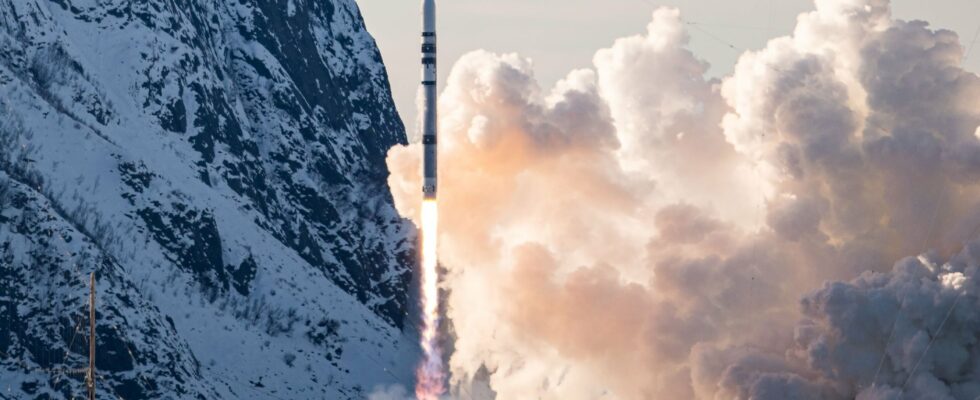The first orbital rocket launched from continental Europe crashed after a flight of a few tens of seconds on Sunday, March 30 on the Norwegian space base of Andøya in the Arctic. Quickly after taking off, the Spectrum rocket, a two-story machine developed by the German start-up Isar Aerospace, started to oscillate, turned around and then fell into a powerful explosion noise, according to images diffused Live on Youtube. An orbital rocket is a launcher capable of placing a payload, such as a satellite, on or beyond terrestrial orbit.
According to Isar Aerospace, the rocket fell into the water and “the shot seems intact”. Referring to “an incident”, Andøya Space, the Norwegian public company which manages the space port of Andøya near the Idyllic archipelago of Lofoten, announced the implementation of a “crisis device”. No human or material damage was reported after the fall of the rocket, regional police said.
Upstream of the shot, postponed several times because of the weather conditions, Isar Aerospace had indicated that he had little hope of reaching the terrestrial orbit from his test. “Our first test flight met all of our expectations, constituting a great success. We had a perfect takeoff, 30 seconds of flight and we were even able to validate our flight interruption system,” commented Daniel Metzler, the co -founder and boss of the young German shoot.
Measuring 28 meters high for two meters in diameter, Spectrum has a one -ton carrying capacity. On Sunday, she flew to empty for her inaugural flight.
Before this shot, a first attempt at orbital flight from Europe had taken place in early 2023 in Great Britain, led by Virgin Orbit of billionaire Richard Branson. Unlike Isar Aerospace, the company had not used a shooting step, but a Boeing 747 to take off a rocket at altitude. She had resulted in a failure and the company had put the key under the door.
“New Space”
The space occupies an important place in the Draghi report, published last year, on the competitiveness of the European Union. Deprived of access to Russian cosmodromes and launchers because of the serious tensions with Moscow, Europe experienced a bad pass because of delays in the development of the Ariane 6 rocket and a suspension of the VEGA-C launcher after an accident. It was not until March 6, with the first commercial flight of an Ariane 6 since Kourou in French Guyana, that she found her spatial sovereignty after several months without independent access to space.
Founded in 2018 in Munich, Isar Aerospace is one of these young shoots from the new space economy (“New Space”), these small private actors who attack space next to institutional heavyweights like Arianespace.
Compared to the United States which has large companies like SpaceX by Elon Musk and Blue Origin by Jeff Bezos, the “New Space” is still in its infancy in Europe. In addition to Isar Aerospace, the Germans Rocket Factory Augsburg (RFA) and Hyimulse, the French Latitude and Maiaspace (Arianegroup’s subsidiary) or the Spanish PLD Space are engaged in a speed race to win the European micro or mini-tingers sector.
Sunday shooting has generated “tons of data that teams can now assess to learn from it,” said an Isar Aerospace commentator on Youtube.
In addition to the launchers, multiple European projects of space ports, from Portuguese Azores to the British Shetland via Andøya or Esrange in neighboring Sweden, have germinated, often determined to shoot the first. Presenting itself as “the first operational space port in continental Europe”, Andøya praises its location in the Arctic, ideal for the launch of polar satellites or heliosynchrones, that is to say which pass over any point on the planet at the same local solar time every day.
